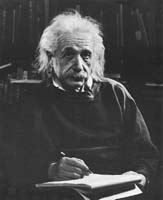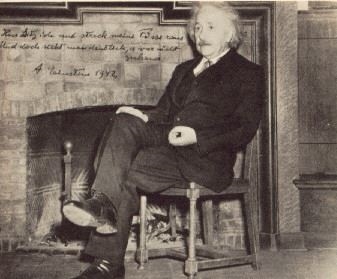 |
Albert Einstein is one of the best-known scientist of the twentieth century. His ideas led people to understand time, space, gravity, and the nature of light. Besides his scientific achievements, he is also known for trying to make the world a better place for all people. Albert Einstein was born March 14,1879, in Ulm, Germany. His father's name was Hermann and he owned a small electrochemical factory. Einstein was a poor student, and was never really happy in school. He hated to memorize facts and rules, but he taught himself philosophy, math and science. He would ask difficult questions during class, this led teachers to believe that Einstein was trying to start trouble. He was very good at mathematics and literature.
 |
During his teenage years, he became interested in popular science. He started to wonder about the mysteries of the universe. When Einstein was seventeen, he took the entrance examination to the prestigious Swiss Federal Institute of Technology in Zurich.. Though he failed this examination the first time, he passed at his second attempt. Einstein began his four years studying physics and mathematics. After Albert Einstein's graduation in 1900, he became a naturalized Swiss citizen. His first job was a technical assistant at the Swiss patent office in Berlin. In 1905, he published an article entitled "A New Determination of Molecular Dimensions". This was all sited in the German physics monthly Annalender Physik.
 |
In 1903, Albert married his university sweetheart, Mileva Maric. He worked as a professor of physics in Prague and Zurich, before moving to Berlin in 1914. By this time, Albert had two sons, Hans Albert and Eduard. Unhappy with their life in Berlin, his wife Mileva returned to Switzerland with their sons. This separation led to their divorce in 1919. Later, Albert Einstein married his second cousin, Elsa Lowenthal. In 1905, Einstein proposed his special Theory of Relativity. This theory showed that gravity is also relative. This theory explained that a person gaining speed would feel a force exactly like the force of gravity. This theory was published in the Principle of Relativity, Sidelights on Relativity, and the Meaning of Relativity. Einstein represented his theory using the mathematical equation of E = mc2. This equation represents energy as equaling mass times the speed of light squared.
In November 1919, the Royal Society of London announced that their experiment conducted during the solar eclipse, of that year, had confirmed the predictions Einstein made, in his general theory of relativity. The implications of this announcement shook the world of science and earned Albert Einstein the international acclaim he had long deserved.
In the years following World War I, Albert Einstein received a lot of criticism within Germany, for his theories, as well as his support of pacifism. He traveled far to deliver lectures on relativity, going to Europe, Asia, the Middle East, and South America. He first toured the United States in the spring of 1921, in order to raise money for the Palestine Foundation Fund. In 1921, Einstein was awarded the Nobel Prize in physics. He was cited by the prize committee "for your photoelectric law and your work in the field of physics". Einstein's Theory of Relativity was sure to become his most enduring legacy.
Page created on 2/11/2001 12:00:00 AM
Last edited 2/11/2001 12:00:00 AM
